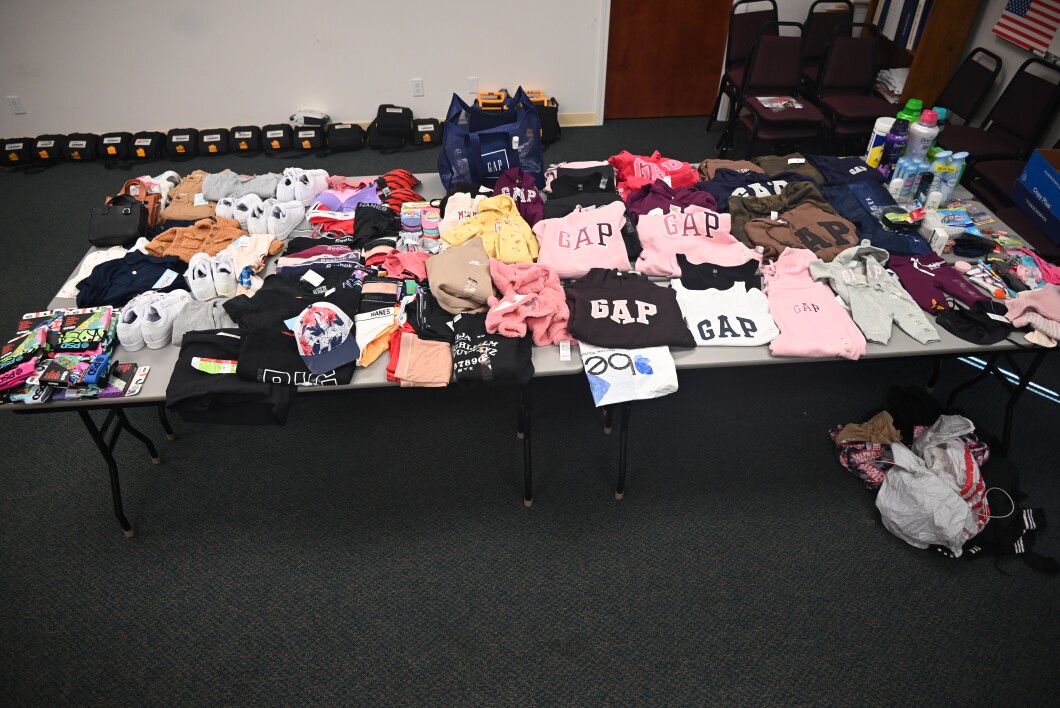
Retailers across the country are upping their security game, working with local law enforcement officials, adding in-store cameras, and taking other measures ahead of Black Friday so that the unofficial start of the holiday shopping season doesn’t put their businesses in the red.
Major retailers such as Target, Walgreens, CVS, and Sephora have already started to remove high-value items like perfume from store shelves and replace them with tester samples to keep people with sticky fingers away. Others have turned to self-serving locking cabinets, tethering items to steel cables, and smart shopping carts that have sensors like cameras, weight scales, and bar code scanners that allow them to detect the items customers are picking and paying for and which ones they are not.
“Retail crime continues to be of great concern ahead of this holiday season,” David Johnston, National Retail Federation vice president of asset protection and retail operations, told the Washington Examiner. “Retailers remain focused on providing a safe shopping environment while ensuring products are protected and available for their customers. Leveraging partnerships with local law enforcement, property managers, and peer retailers will play a key role in a safe and secure holiday shopping season.”
That may be wishful thinking in the nation’s capital, where a rise in retail theft has led to CVS pulling toilet paper and paper towels from its shelves and replacing them with framed photos of the missing products and a buzzer to inform employees who will eventually, usually after multiple tries, bring the product to the customer from a back room.
Walgreens announced this year that it would be testing a new store concept in Chicago that has most of its merchandise under lock and key.
While the largely inconvenient strategy may work in some cases, it has also led to backlash from customers who are choosing to take their business elsewhere or are altogether pivoting to buying their products online.
Retailers, acutely aware of the situation unfolding, have been working in tandem with local law enforcement officials to carve out a game plan ahead of Black Friday, one of the biggest shopping days in the country. The NRF estimates that 72% (130.7 million) of people are planning to shop on Black Friday, up from 69% in 2022.
Edinburgh police Chief Doyne Little told the Washington Examiner he spoke to employees at Indiana’s outlet malls in preparation for the retail frenzy following Thanksgiving and said the best way they can deter theft is by staying extra vigilant, though he added that employees shouldn’t attempt to intervene physically during a crime.
“I get paid to take the risk, they do not,” he said.
Little speaks to retailers and their employees on a quarterly basis about theft prevention and said beefing up staff to make sure all customers are attended to is another way to go.
“Great customer service is the best thing in the world,” he said. “If you give good customer service, [shoplifters] are apt to walk out the door because they are looking for those who aren’t paying that much attention because they don’t want that attention. So give them as much customer service as your staff can give them and if you charm them to death and they are still causing a problem, call the police. That’s what we are here for.”
Little added that one of the most important things store employees can do is document the situation and snap a picture on their phone so authorities can use facial recognition software or at the very least get the picture to the public in hopes someone can provide additional information.
“Usually our dispatch center is really good about trying to keep [store employees] on the phone if it’s an in-progress thing and to paint that picture for us,” he said. “If they can’t give us a good picture of what’s going on, we don’t know what we’re getting into.”
In the past two months, Edinburgh police have recovered thousands of dollars worth of stolen merchandise across the state and said they are up for the herculean task ahead of them on Black Friday.

The town is located on two main thoroughfares, U.S. 31 and Interstate 65, and attracts shoppers and shoplifters from Louisville, Chicago, and even some as far away as Nashville.
“Edinburgh is a pretty small community, but [because of the outlet malls] we get a lot of practice at this,” he said.
About 3 1/2 hours up the road, retailers on Chicago’s famed Magnificent Mile have turned into a hub for thieves who operate in coordinated and sophisticated rings ready to take items and resell them on the black market.
“The vast amount of merchandise that is stolen, high-end merchandise and medium-end, is being stolen in large numbers by individuals who work for organized crime enterprises,” Roe Conn, director of data-driven strategies for the Cook County Sheriff’s Office, said.
A $276,000 grant from Illinois Attorney General Kwame Raoul last year allowed law enforcement to bolster its retail theft task force, which has officers going old school – walking their beats, talking with businesses, and engaging with the community, in hopes their presence will deter shoplifters. Many of the retailers at high-end shops like Saks Fifth Avenue, Ferragamo, Cartier, and Tiffany & Co. are also relying on private security, though their authority is limited.
Thefts in the city’s 18th District, which encompasses most of Cook County, have surged by 83% to 1,101 in 2023 from 602 in 2020.
Ulta Beauty, headquartered in Bolingbrook, Illinois, has been repeatedly hit by shoplifters, the most recent incident taking place in mid-November when a group of women smashed a store window and took off with about $10,000 in merchandise from the popular makeup store.
“The rise in organized retail crime is affecting all retailers, including Ulta Beauty,” a company spokesperson told the Washington Examiner. “We always want our associates and guests to feel safe and have a positive experience in our stores, which is why we proactively partner with law enforcement, other retailers, and industry associations to implement best-in-class policies, specialized training, technology, and enhanced fixtures in our stores to deter crime and ensure everyone’s safety.”
Ulta regularly reviews its safety policies to make sure they reflect the evolving retail landscape but was tight-lipped about sharing specific measures being implemented on Black Friday.
Two years ago, more than 30 people robbed a Best Buy in Minneapolis on Black Friday, in concert with another Best Buy in the metro area. That year, the National Retail Federation survey showed a 26.5% increase in organized retail crime incidents from 2020.
This year, the Council on Criminal Justice released a study that looked at shoplifting incidents in 24 cities over the past five years. It found that New York and Los Angeles had the largest uptick in reported incidents from midyear 2019 to midyear 2023. The two cities with the largest decline were St. Petersburg, Florida, and St. Paul, Minnesota.
Gov. Gavin Newsom (D-CA) announced in August that he instructed the California Highway Patrol’s Organized Retail Crime Task Force, which has cracked down on organized retail crime, to help Los Angeles get a similar program in place to help local law enforcement address retail crime. CHP will triple its resources in the city.
“The state is investing hundreds of millions of dollars to crack down on organized crime and when our local partners need further assistance, we’re ready with a helping hand,” Newsom said.
However, the partnership between the police and some big box retailers is experiencing some growing pains.
Last week, the sheriff of California’s Sacramento County accused Target leaders of trying to prevent deputies from stopping shoplifting incidents despite the store routinely asking for help from the authorities.
“We don’t tell big retail how to do their jobs, they shouldn’t tell us how to do ours,” Sheriff Jim Cooper posted on X, formerly Twitter.
I can’t make this stuff up. Recently, we tried to help Target. Our Property Crimes detectives and sergeant were contacted numerous times by Target to help them with shoplifters, mostly who were known transients. We coordinated with them and set up an operation with detectives and… pic.twitter.com/2TJCXApGMs
— Jim Cooper (@SheriffJCooper) November 9, 2023
Cooper claimed Target and his office worked to conduct an operation at one of the stores, but the plan crumbled after the Target team made a list of rules telling officers how and where they could arrest suspects.
“At the briefing, we were told by their head of regional security that we could not contact suspects inside the store; we could not handcuff suspects in the store; and if we arrested someone, they wanted us to process them outside… behind the store… in the rain,” the sheriff said.
CLICK HERE TO READ MORE FROM THE WASHINGTON EXAMINER
The list of rules from the company came down to Target wanting to avoid bad press, Cooper said.
Calls to Target for comment were not returned.





